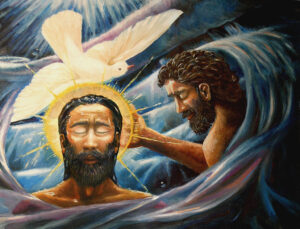 The Sunday after the Epiphany is celebrated as The Baptism of the Lord. On this day we transition from the first two special seasons of the Church year (Advent and Christmas) to the counted weeks of the year, Ordinary (meaning Counted) Time. Our focus shifts from readings preparing us for the coming of the Lord and those telling of the fulfillment of the prophecies of his coming with his birth, to those that detail just what he did when he came. What he taught and how people responded will be the focus of our readings in Ordinary Time.
The Sunday after the Epiphany is celebrated as The Baptism of the Lord. On this day we transition from the first two special seasons of the Church year (Advent and Christmas) to the counted weeks of the year, Ordinary (meaning Counted) Time. Our focus shifts from readings preparing us for the coming of the Lord and those telling of the fulfillment of the prophecies of his coming with his birth, to those that detail just what he did when he came. What he taught and how people responded will be the focus of our readings in Ordinary Time.
Through the years, I have often heard it said that Jesus “submitted” to John’s baptism as a model for all of us. Jesus was without sin, so there was really no need for him to enter into the Jordan River and receive the baptism of repentance that John preached. As we look back on these events, it’s tempting to see them with 20/20 hindsight. We believe that Jesus is sinless, an unblemished human, who gave himself as the perfect model of fidelity to God’s will. Christian writers through the centuries have reflected on the image of Jesus as the perfect and final lamb offered in sacrifice to God, for the “expiation of sin,” an offering in blood to make up for Adam and Eve’s disobedience in the Garden of Eden.
Yet I find myself thinking there might be something else here to notice. Jesus grew up in a family in a small village. His father was a tradesman. His mother was a homemaker. These were both full-time jobs. Both worked to support their life as a family and Jesus would have been part of that working community, doing his share of the chores along with his parents. As a child he learned of his faith and celebrated Bar Mitzvah, becoming a man in his community. He learned a trade and began working as a carpenter, a tradesman like his father. His life was so completely unremarkable that when he came home to Nazareth later to teach the members of his community of faith, they were not able to see past the normality of his life as they had known it and recognize the gift he was bringing to them.
Then when he was about 30, his cousin John came out of the desert and began preaching up and down the Jordan River. John spoke of the coming of the Messiah, the one so long ago promised. He taught about caring for each other and living justly. People went out to see him. John spoke of repentance, a long-time theme among prophets. Return to living as the people of the covenant! Make straight the way of the Lord! Many wondered if he might not be the Promised One himself.
Now, wander in your imagination with me for a moment. Let’s assume that Jesus was an ordinary man. He didn’t know the full implications of anything he did in the course of his life. He didn’t know he was God become human. He didn’t know that he had never sinned, never deliberately hurt anyone or broken the Law. But I wonder if there might not have been times when he was uncertain whether his actions had been the right ones or not. Might he have thought that there were things he would have done differently if he had been given a chance? A sort of “do-over” that we humans often could use? If this was indeed true, then it makes sense that Jesus, a good and just man who was trying to be the best person he could, always faithful to his God and the covenant, would go to the Jordan to hear John preach and enter the water to be baptized, to be renewed in his life of faith.
We know that Jesus was baptized in the Jordan River and we celebrate that today. When he came out of the river, dripping wet, he stopped to pray, to reflect on what he had experienced there in the water, and maybe to recommit himself to God and his life of faith. St. Luke tells us that as Jesus was praying, “heaven was opened and the Holy Spirit descended upon him in bodily form like a dove.” The coming of God’s Holy Spirit was palpable. It was like a dove gently landing on his shoulder might have felt. It was physically noticeable. It could be felt. Then Jesus heard a voice from heaven, “You are my beloved Son, with you I am well pleased.” The coming of God could be heard too. (Lk 3:15-16, 21-22)
This experience changed the course of Jesus’ life. It was a kind of conversion experience, though he was not a person who had lived a life of great sin or disobedience to God’s commands. He left the Jordan River a different person than when he had come. His consciousness had changed. He still didn’t know that he was the second person of the Trinity. He didn’t know that he was God become human. He didn’t know that his life would change much of the human history that followed. But he knew something had happened. He was praying and he experienced God’s presence and touch in his life in a very special way. His response was to pray some more. He went to the desert to reflect and pray. When he returned, he began to preach, teach, and heal. We’ll hear much more about that as the year goes on. The point today is that his life was forever changed when he entered into a time of reflection and symbolic washing. He emerged as the one who would baptize with the Holy Spirit and fire, foretold by John and the prophets who had come before.
The first and second readings also speak of the role of the Spirit in the life of the Messiah. Isaiah quotes the Lord as saying he has put his spirit upon the chosen one, the one in whom he is pleased. This chosen one will bring justice to the nations, but peacefully, without shouting or crushing anything that is less than perfect and healthy (bruised reeds or smoldering wicks, for example). (Is 42:1-4,6-7) There is an alternate first reading as well, also from Isaiah. In this one, the Lord speaks words of comfort to those in exile, promising they will return to their own land, with the Lord himself leading them. A voice cries out in the desert, “prepare the way of the Lord.” (Is 40:1-5, 9-11)
St. Paul, in his letter to Titus, remarks that when “God our savior appeared…he saved us through the bath of rebirth and renewal by the Holy Spirit.” (Ti 2:11-14; 3:4-7) This bath of rebirth is our baptism with water. It’s not the same as John’s baptism of repentance, but something even better. It brings an entirely new life, a sharing in God’s divine life through the Holy Spirit.
In another optional reading from the Acts of the Apostles (10:34-38), Luke tells us about Peter’s experience with the household of Cornelius, a Roman centurion who was instructed in a dream to send to Peter and have him come to his home. Peter was hesitant, but when he arrived, he discovered that the Holy Spirit had been poured out upon Cornelius and his family. This confirmed for Peter that the Gospel was for all people, not just for Jews. And the rebirth of baptism was opened to all of us.
In each of these readings, we see the importance of prayer and the gift of the Holy Spirit pouring out on the one who prays, opening up new vistas for life. If even Jesus, the Son of God, needed to pray and open himself to God’s gifts, how much more important is it for us to do the same? We won’t all have dramatic experiences of God’s coming into our lives more deeply. For some it will be a much more gradual, silent, gentle deepening of awareness of the Presence. For others it will be more dramatic. (Those dramatic moments and encounters still happen in our day, sometimes during experiences of prayer or meditation.) The important thing is to remember to pray.
So, let’s take this as our plan for Ordinary time this year. Make time for prayer. There are lots of times and ways to pray. Need to wash your hands for 20 seconds for COVID prevention? A “Hail Mary” and a “Glory Be” will take about 20 seconds. The Angelus is traditionally prayed at in the morning, at noon and at 6 pm. Keep a copy of it inside a cupboard door in the kitchen and pray it as you fix dinner. Eventually you’ll remember it and can pray it in the morning and at noon too! The rosary can be prayed any time, even without a set of beads. Our five fingers on each hand make a great decade counter. Having trouble going to sleep at night, pray the rosary and don’t worry if you fall asleep as you pray (a.k.a. “praying with Jesus in the boat”). Mass is celebrated every day except Good Friday and Holy Saturday. Visit a church once in a while for Mass on a weekday if you are able to fit it into your schedule. Liturgy of the Hours was developed a long time ago for people who couldn’t gather with the Christian community on a daily basis to celebrate the Lord’s Supper. It’s available on-line now or in books such as Christian Prayer. Download Liturgy of the Hours to your phone and it’s ready whenever and wherever you are.
As we celebrate The Baptism of the Lord and the beginning of Ordinary Time, let’s dedicate the same attention to prayer as we do during the special seasons of the year. God is here now, just waiting eagerly to hear from us.
Read More
 Pushy people sometimes drive me crazy. Perhaps because sometimes, I am told, I can be a bit pushy myself! But if someone says a decision is needed immediately, or something has to be done immediately, my reaction is to move more slowly. Hold on a second. What’s the big hurry? Is someone bleeding? Can it wait for a more convenient time? I had other things I was planning to do right now! You get the picture.
Pushy people sometimes drive me crazy. Perhaps because sometimes, I am told, I can be a bit pushy myself! But if someone says a decision is needed immediately, or something has to be done immediately, my reaction is to move more slowly. Hold on a second. What’s the big hurry? Is someone bleeding? Can it wait for a more convenient time? I had other things I was planning to do right now! You get the picture.














